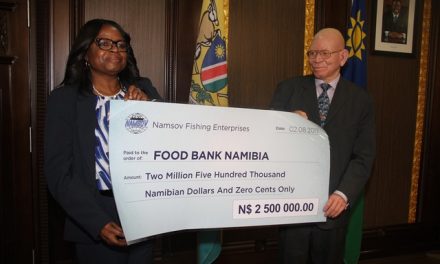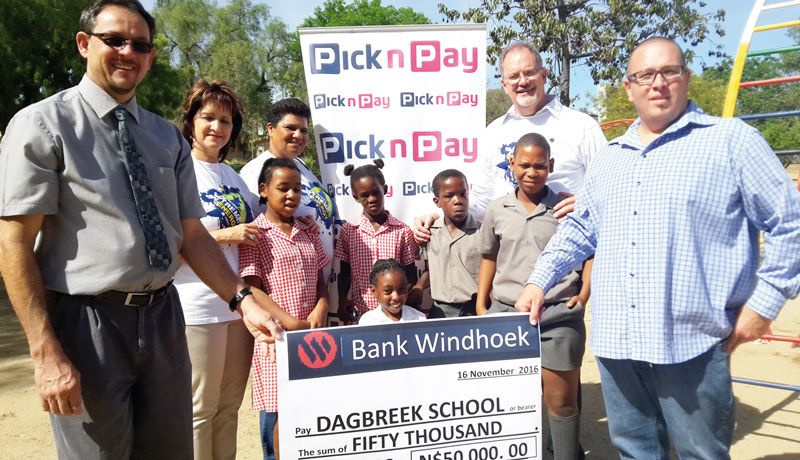
Eenhana set to get wifi internet

As a sign of appreciation to the clinic staff at Oshaango near Eenhana, US Ambassador Thomas Daughton presented a plaque to Head Nurse Fenni Nguti.

US Ambassador Thomas Daughton (standing in the middle), his wife Melinda Burrell (standing to the right) and Peace Corps Volunteers together with the TATE Institute staff and Eenhana youth. Flanking the Ambassador are American Peace Corps Volunteer Erick Seo (left) and 2015 Mandela Washington Fellow Sebulon David who earlier explained to the Ambassador their initiative to draft a grant proposal and secure funding of approximately N$140,000 from the University of Namibia for a special project designed to facilitate wireless internet connectivity for Eenhana residents through the TATE Institute.
The Ambassador highlighted the benefits of YALI, exchange programmes and small grants funding opportunities during a dialogue hosted by the TATE Institute of Technology in Eenhana on Tuesday.
“I am here to encourage you today to apply for the YALI Fellowship programme which is open to everyone irrespective of whether you live in an urban or in a rural area,” explained Daughton to 30 young participants at the event. According to the Ambassador, the number of open fellowships for Namibians will double from nine to eighteen in 2016.
During the town hall meeting, TATE Institute Executive Director Sebulon David shared his experience as a 2015 YALI Mandela Washington Fellow who recently returned from a seven-week training programme in the USA. The fellowship for 500 Fellows from across Africa culminated in a Presidential Summit in Washington D.C. during which President Obama advised the youth to be the leaders they seek.
“Even after my return, I remain in touch with my professors in the US. The beauty of the YALI Network is that they are so encouraging despite all the challenges one may face in Namibia, and eventually you will succeed in your endeavours. YALI is a lifetime opportunity,” said David.
He also described his experience as a grant recipient of the US Ambassador’s Self-Help Program.
The small grant amounted to approximately N$170,000 and served to expand access to information and technology for TATE Institute patrons.
Ambassador Daughton praised the initiative of American Peace Corps Volunteers Erick Seo and Matthews Robles who have assisted the TATE Institute to draft a grant proposal and secure funding of approximately N$140,000 from UNAM for a special project to bring wireless internet connectivity to Eenhana.
Erick Seo narrated the story of a boy who succeeded with his dreams although he did not pass Grade 12, and Matthew Robles added, “You, the youth, are the present and the future of Namibia and you can make anything possible if you want to. Identify a problem and find a solution. It’s all about motivation. Never give up!”
Earlier in the day, Ambassador Daughton had visited a US government-funded civic education workshop hosted by the Namibia Institute for Democracy under a tree on the outskirts of Eenhana. This was one of close to 600 workshops currently conducted countrywide under the project known as the “Youth Leadership for Democracy Participation in Namibia.” Amongst others, the youth learn about Namibia’s political structures and how to participate in civic processes, including using social media platforms such as Facebook and Twitter.
On Wednesday the Ambassador visited the Oshaango Clinic near Eenhana where only three nurses cover an area with 7,000 residents. The clinic currently cares for 774 patients on anti-retroviral medication to treat HIV/AIDS. The US government supports the efforts of Oshaango Clinic through the Centres for Disease Control and the US President’s Emergency Plan for Aids Relief (PEPFAR).
Ohangwena Regional Director for Health, Mr John Hango thanked the American people for their continued support of Namibia’s health sector. Over the past10 years, the United States government, through PEPFAR, has provided approximately N$10 billion to combat HIV/AIDS.











































